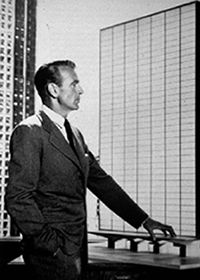 Joe Carter as an interesting post comparing the character of George Bailey from It's a Wonderful Life and Howard Roark from The Fountainhead:
Joe Carter as an interesting post comparing the character of George Bailey from It's a Wonderful Life and Howard Roark from The Fountainhead:But what makes George Bailey one of the most inspiring, emotionally complex characters in film is that he continually chooses the needs of his family and community over his own self-interested ambitions and desires – and suffers immensely for his efforts.
Although sentimental, Capra’s movie is not a simplistic morality play. In the end, George is saved from ruin but the rest of life remains essentially the same. By December 26 he’ll wake to find that he's still a frustrated artist scraping out a meager living in a drafty old house in a one-stoplight town. In fact, all that he has gained is recognition of the value of faith, friends, and community and that this is worth more than anything else he might achieve. Capra’s underlying message is thus radically subversive: it is by serving our fellow man, even to the point of subordinating our dreams and ambitions, that we achieve true greatness.
Carter then moves on to Howard Roark:
 For instance, Roark lives to create inspiring works of architecture but cannot do so without relying on others. When society fails to appreciate his “genius”, his egotistical purity leads him to engage in a massive destruction of private property. By the end of The Fountainhead Roark is revealed to be an infantile, narcissistic, parasite.
For instance, Roark lives to create inspiring works of architecture but cannot do so without relying on others. When society fails to appreciate his “genius”, his egotistical purity leads him to engage in a massive destruction of private property. By the end of The Fountainhead Roark is revealed to be an infantile, narcissistic, parasite.Bailey, on the other hand, has all the marking of a repressed, conformist, patsy. He lives for others (a sentiment that would make Ayn Rand gag) rather than “following his bliss.” He compromises everything but his integrity. And yet he discovers that he has all that makes life worth living.
I'll agree with Carter on all but two points. It is true that there is no joy in the path of Objectivism (I've tried). Because Objectivism places selfishness as the highest virtue, it is completely incompatible with Christianity. It is infantile and narcissistic to suggest that a person can be completely self-sufficient in all areas, especially the emotional. But Roark did not destroy private property because society failed to appreciate him. He destroyed his own private property which was stolen from him.
Roark was both superhuman in his self-sufficiency and subhuman in his uncaring nature toward his fellow man. But he was not a parasite. In fact, he was the opposite of a parasite. He strove to burden no one else with his own needs. He took from no one, but only acquired through voluntary exchange.
Roark was wrong on everything else, but his unwillingness to steal was a virtue that we all should emulate.
UPDATE: Henry Neufeld wondered if it is possible, if not necessary, to have elements of both Bailey and Roark in our personalities.

No comments:
Post a Comment